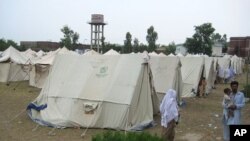Crowds of Pakistanis swarm together in a camp at the Government College of Technology in Nowshera, 40 kilometers east Peshawar.
In a recessed field at the site, patches of dirty water lie among rows of open tents stenciled with green Pakistani government lettering and emblems.
Ghulan Rasool lives at the camp with his four children, after losing everything he owns in the flooding.
He says children are dying from hunger. There is no medicine. He says all of his children are sick and they have not received any food or water. He says they need everything, but they have not received anything.
Mohammed was luckier. He tells VOA that he recently was able to send his two children to live with a friend's family. After living in the camp for just a few days, he says they had begun suffering from high fevers.
He complains that trucks with supplies come infrequently, and when they do, officials just throw out the goods into the crowd.
"As they are taking the drinking or edible things here, the people just assemble. There is not a proper planning just to distribute all the things to all the affectees," he complained.
Shaukat lives at the camp with his four children. He says they are treated like dogs with the way workers pass out food.
Camp officials say they have plenty of supplies to take care of the influx of people fleeing from the floods.
They say the problem is that many people are coming to the camp who do not need the assistance.
Sean Maroney narrates a slide show of photos he took at the camp.
The camp's chief coordinator Noor Shad oversees aid for nearly 2,000 individuals.
"We have everything, from water, non-food items [and] food items. We have everything," he said.
Shad says representatives with the International Rescue Committee are registering people, and Oxfam is on site to help with medical treatment. But he says too many people are sneaking into the camp to receive free handouts.
"We are not able to provide them. From those people who are not victims," said Shad.
The floods have destroyed hundreds of thousands of homes and washed away roads, bridges, crops and livestock.
As weather forecasters predict more rain in the days to come, U.N. officials say the scale of the disaster could be worse than January's earthquake in Haiti, the 2004 tsunami and the 2005 earthquake in Pakistan combined.




